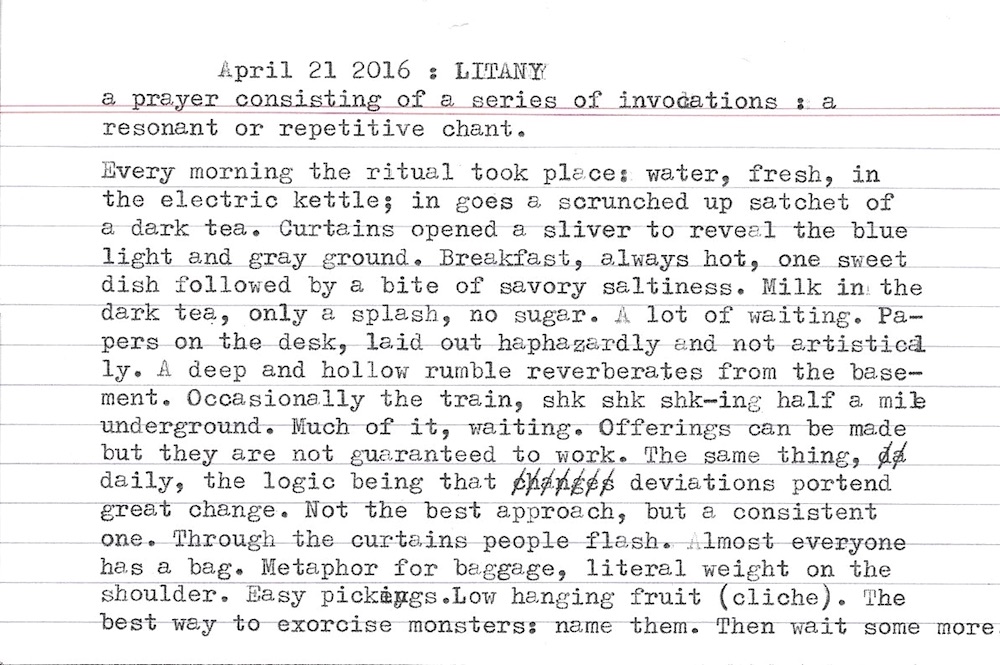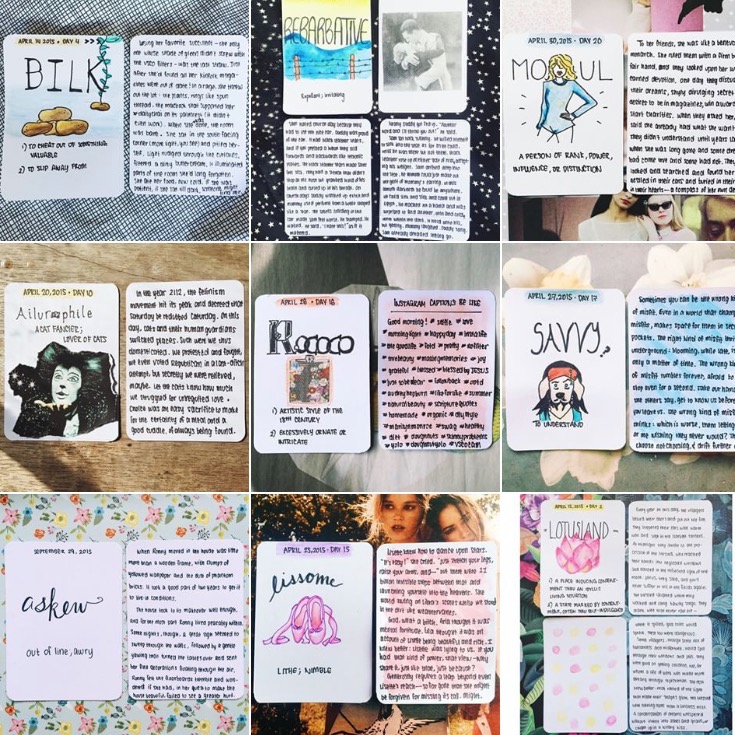Over the years I’ve had an on-and-off writing project called Flash Fictionary. The project calls for a daily short story inspired by Merriam-Webster’s Word of the Day. The stories are roughly 200 words long. At the moment I type each one on a 4×6 index card, so the story ends when the card does.
Flash Fictionary had its longest run of 26 stories in 2015, then became dormant. In November, I made one ill-fated attempt to bring it back, then stripped it down to the essentials and made a new home for it. In resuming the project, I’ve confronted familiar fears about writing–but also realized that, over this rather long hiatus, other fears have receded in significance.
The bad news is, there will always be a strong inner editor telling me that my writing is crap. The good news is, writing crap matters less than the act of writing itself. A week and a half ago I had 0 new stories; now I have 11. This time, quantity trumps quality. What more can a struggling perfectionist ask for?
Here are other small lessons I’ve picked up so far from writing flash fiction every day:
The stories will be rough.
They aren’t just first drafts: they’re baby drafts, shaking and ugly and out of control. Like babies, they don’t communicate their needs and wants all that well. But they exist.
“You can’t edit a blank page,” is a quote attributed to everyone from Nora Roberts to Meg Cabot to Shakespeare. Regardless of who said it, it’s true. Flash Fictionary forces me to confront the rawness of my own writing, even on days when it feels like sewage is leaking out of my fingers. Because a small percentage of the time, the words don’t feel like sewage: they feel like rainbows and Nutella and freshly-baked bread slathered in salted butter.
To write more, reduce the barriers to entry (AKA don’t make it so hard for yourself to write!)
Barriers to entry is an economic term describing the different obstacles a business encounters before it can enter the market. For example, starting a telecommunications company has high barriers to entry, while selling candy has low barriers to entry.
The more steps it takes for me to write and upload a story, the more likely I am to quit. The very first time I attempted Flash Fictionary (2004? 2005?), I set no limits on story length. This also happened during NaNoWriMo 2015. As a result, I found it hard to finish the stories in a day, and lost steam early on.
When I did Flash Fictionary in 2015, I limited the stories to 1 or 2 handwritten cards, because that removed the temptation to delete and edit as I went. However, because the stories were going on Instagram I tried to make them look visually appealing. Cue spending hours on: sourcing colorful background patterns, waiting to photograph in natural light, and illustrating all the title cards.
For this iteration, I use 1) a typewriter 2) a single 4×6 card and 3) a scanner. Everything is typed: no hand-lettering, no watercolor illustrations, no endless searching for the right VSCO filter. I can post each story any time of the day. I do miss the bright colors of the Instagram versions, but not as much as I love faff-free writing.
You have a daily opportunity to work on different writing techniques.
I know what my biggest writing weaknesses are. My writing style is rather languid. I get lost in long sentences. In drafts, I chase tangents with abandon, often abandoning my original idea entirely. I struggle with clarity.
Flash Fictionary allows me write through my weaknesses. For example, ‘Fossick‘ was an attempt to incorporate more suspense, urgency, and dialogue. ‘Exodus‘ resulted out of a personal challenge to write within a specific, real setting. For future stories, I can mimic the styles of authors I admire, or attempt specific challenges like “Use more sensory detail.”
It’s fun and experimental, but more importantly, it’s good practice.
Finally, endings are really hard.
I often forget about ending the story. (It happens when you start hundreds more stories than you finish.) By the time I realize it’s time to wrap it up, I’ve run out of card. Endings are my biggest weakness, and it will take more than two weeks of writing short stories to be comfortable enough (and ready) to write them! But at least I’m beholden to finishing at least one story a day.
It’s a start.
For the rest of the stories, please check out FlashFictionary.com. Feel free to write some flash fictionaries of your own!



